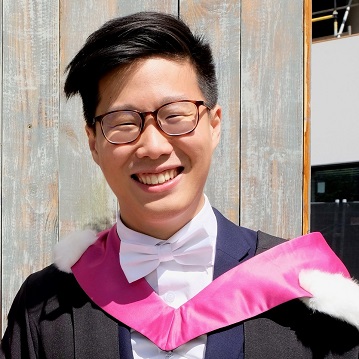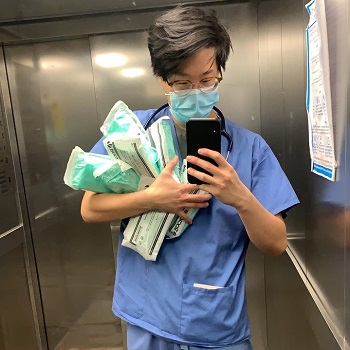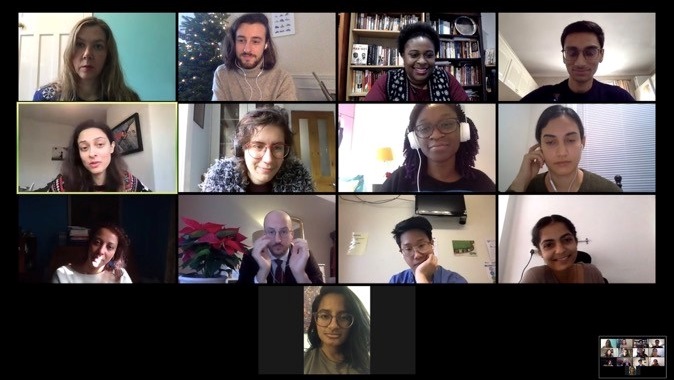
Dr Adriel Chen is a University of Edinburgh MBChB Class of 2019 graduate, and current FY2 rotating through Medicine of the Elderly in NHS Greater Glasgow and Clyde.
What is your current role?
I’m currently an FY2 rotating through Medicine of the Elderly in NHS Greater Glasgow and Clyde. Come April I’ll be an FY2 in Plastic Surgery. I’m also a researcher with the Global Health Governance Programme at the University of Edinburgh. During the COVID-19 pandemic I’ve been working with the team on rapid policy research, producing policy briefs, rapid evidence reviews and summaries, and scientific advice.
What have you been up to since graduation?
I’ve been busy! The foundation program works you hard, and FY1 (the first year) is particularly notorious for burnout. COVID-19 changed most of my plans, but I’ve been doing what I can do build a portfolio to apply for paediatric training. This involves research, audits, teaching, and generally building on my interest in paediatrics; and on top of that also working on the aforementioned research with the GHGP. I’ve really enjoyed teaching and the research that I do, which makes it worth the effort. On a personal note, I’ve also gotten engaged since graduation!

How did you find the transition from university to foundation years? And advice for current students?
It was a bit of a shock. All of a sudden you’re a doctor with responsibilities (and endless secretarial tasks), and no amount of clinical exposure as a medical student can fully prepare you for it. It’s also been enjoyable in a lot of ways. I’ve found satisfaction with work and I’ve really enjoyed the “medicine” side of things, reviewing patients, forming plans, interpreting scans… It’s the intellectually stimulating aspects of the job that make the rest of FY1 and FY2 bearable.
Medical students right now have it tough. My one and only piece of advice would be to remember be kind to yourself. Medical school in Edinburgh is a tough place to be; imposter syndrome is everywhere and nobody really talks about it. I’m not going to encourage you to do this project, or that audit, or be in a committee- I think there’s a time for that (and that time is not during a very stressful global pandemic). Be kind to yourself. Then be kind to others.
Why have you chosen this career path?
Same as most doctors, really. I enjoy working with patients and working in healthcare, and it’s nice to be intellectually stimulated. But more importantly I chose medicine because I believe healthcare is a universal right and that the medical profession needs to do better on a lobbying/policy-making level. Whether we like it or not, healthcare is a political subject.
What are your aspirations for the future?
We recognise that poverty is a comorbidity; that wealth redistribution works and isn’t a radical/socialist idea, and that we can reduce the harm done to millions of climate refugees in the coming decades.
Who inspires you?
My father. His work ethic and strength of character has always been an example for me to be better. He also inspires me to work smart. I’ve really taken up his belief in the value of knowledge and that the greatest reward in the pursuit of knowledge is knowledge itself.

Your Twitter profile tells us you are interested in the intersections between health and wealth, can you expand on this?
In short: health is wealth. The COVID-19 pandemic has produced near-irrefutable data about this. You need wealth to have health, and good health begins before a hospital or GP clinic. But, broadly speaking, you need good health to generate wealth. This is profoundly apparent in childhood poverty.
You have been involved in Covid-19 research and its impact on specific areas of society in your work with the Global Health Governance Programme, please tell us more?
I wouldn’t say I’ve been heavily involved – there are other full-time researchers and academics out there who are doing brilliant and amazing work, and I think they deserve far more credit than I do, and I think it’s important to acknowledge that.
I first joined the Global Health Governance Programme (GHGP) in 2017 as a student researcher and I’ve continued to work with them after graduating in 2019. It’s a great team to work with. Everyone’s really supportive and helpful, and the multidisciplinary nature of the team means that there’s always something new I can learn from my colleagues.
Pivoting from research on global health governance to Covid-19 research has been tiring but also very rewarding. I think the team was always aware that a pandemic was a question of “when”, and not “if”. So when the pandemic started it seemed like a natural transition for us to make.
What impact has being involved in the Global Health Governance Programme had on your career so far?
As someone who’s interested in healthcare policy, I it’s been really good to gain experience. We’re seeing a close relationship and turnaround time between scientific evidence and policymaking. It’s definitely encouraged me that I’m on the right path, as far as my interests and aspirations go. It’s reaffirmed that this is what I’m truly interested in.
In other ways it’s also helped me realise that yes, I can do this. It’s also made confront imposter syndrome early on in my career, which I’ve been told will persist for a long time.
Any pivotal moments, particular achievements/pivotal moments in your career so far?
I think it was in March/April 2020- Devi (Sridhar) and I did some quick research looking at the indirect impact of previous pandemics to try and have a better idea of what to expect. We quickly realised that children were among the greatest risk groups. This kept me up for a few nights and also made us focus on children’s wellbeing.
We were lucky enough to be able to push and advocate for this early on in the pandemic, and it was very satisfying to see Scotland lead the trend in prioritising children. It’s also been very difficult, as there are lots of stakeholders and we have to try and advise on the best policies based on the best available evidence at the time- and the evidence and situation is always changing! Something that really resonated with me was the recent reopening of schools- it’s a huge relief to see this happen. But believe me when I say that a lot goes on behind the scenes and the government tries its best to consider every stakeholder.
What advice do you have for medical students and aspiring doctors?
Be kind to yourself.
Why might medical students consider becoming involved in global health research and research in general?
Firstly, not everyone has an aptitude or appetite for research. And that’s a good thing. We need to recognise that there is strength in diversity and we should all try and play to those strengths. However, if you’re a medical student then you should consider research because you might find it interesting! Edinburgh has plenty of research opportunities and fields, and there will probably be a field that aligns with your research interest.
Global health research is interesting because it’s very multidisciplinary, and that means you’re likely to find a niche that aligns well with your research interest. For example, you could be interested in osteoporosis, and get involved in research about the cultural determinants of dietary calcium, which would then inform government policy and international aid/WHO/UN involvement. It’s all very interlinked and multidisciplinary, which makes it very interesting, intellectually stimulating, and highly rewarding. It’s like a sudoku puzzle, except with multiple players and everyone’s trying to complete it with their own methods.
What do you enjoy doing in your free time?
I read and watch movies. I also take the chance to video call family and friends, it’s been over a year since I last met some of them in person! I also enjoy running and bouldering.
How do you unwind after a busy day in work?
Busy days call for a casual sitcom like The Office, or Community. And then I read. I tend to flit between books and magazines articles on current affairs. If it’s been a stressful day I go for a run.
Find Adriel on Twitter @Adriel_KH_Chen


